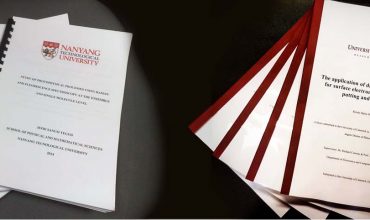Demystifying the Distinction: Book vs. Dissertation
The academic journey often culminates in a significant project showcasing your research and expertise. While both books and dissertations represent substantial intellectual endeavors, they serve distinct purposes and cater to different audiences. This guide delves into the key differences between books and dissertations, equipping you with a clear understanding of their characteristics and target readers.
The Essence of a Dissertation:
A dissertation is a lengthy written document that serves as the culmination of doctoral research. It presents a focused and original investigation into a specific topic within your chosen academic discipline. The core objectives of a dissertation include:
- Demonstrating your ability to conduct independent research: The dissertation showcases your research skills, from formulating a research question to collecting data, analyzing results, and drawing conclusions.
- Contributing to existing knowledge: Your research should offer a fresh perspective or address a gap in existing scholarship within your field.
- Defending your research: The dissertation culminates in a defense, where you present your findings to a committee of experts who assess the validity and significance of your research.
Key Characteristics of a Dissertation:
- Target Audience: Primarily academic experts in your field, including your dissertation committee and potentially a wider academic audience within your discipline.
- Style and Tone: Formal and scholarly, adhering to the specific formatting and referencing guidelines of your university.
- Content: Focuses on a specific and well-defined research question. The dissertation delves deeply into the topic, presenting the research methodology, data analysis, and a critical discussion of your findings. Originality and a strong contribution to existing knowledge are paramount.
- Structure: Typically follows a prescribed format, including an introduction, literature review, methodology chapter, results chapter, discussion chapter, conclusion, and references.
The World of Books:
A book is a published written work on a particular subject or theme. Books can be aimed at a broad audience or cater to a specific niche. The core objectives of a book can vary depending on the genre:
- Disseminating Knowledge: Academic books aim to expand upon existing knowledge within a discipline, offering a comprehensive exploration of a subject or presenting original research findings.
- Engaging a Wider Audience: Books can provide a wider reach beyond academia, educating and informing the general public or specific professional communities.
- Sharing a Story or Perspective: Non-academic books encompass a vast array of genres, from fiction and biographies to self-help guides and cookbooks. The primary focus may be to entertain, inform, or inspire readers.
Key Characteristics of a Book:
- Target Audience: Varies depending on the book’s genre and content. Academic books might target students, researchers, or professionals within a specific field. Other books aim for a general audience with a broader range of interests.
- Style and Tone: Flexibility in style and tone exists depending on the genre and intended audience. Academic books maintain a formal and scholarly approach, while non-academic books may adopt a more conversational or creative style.
- Content: The scope of a book can be broader or narrower than a dissertation. Academic books might offer a comprehensive overview of a field or delve into a specific research area. Non-academic books offer a diverse range of content, from fictional narratives to practical advice. Originality can be valuable, but not always the sole focus.
- Structure: While some academic books adhere to a structured format similar to dissertations, others may adopt a more flexible structure depending on the genre and content.
Bridging the Gap: From Dissertation to Book
Many scholars find their dissertations hold the potential to be transformed into compelling academic books. This process involves significant revisions to bridge the gap between the two formats:
- Broadening the Audience: Tailoring the content and language to a wider audience beyond academic experts.
- Enhancing Readability: Streamlining the text, incorporating storytelling elements, and potentially adding case studies or illustrative examples.
- Updating the Content: Incorporating recent research developments and addressing any feedback received during the dissertation defense.
- Restructuring the Text: Reorganizing chapters, adding introductory or concluding material, and potentially removing highly technical sections.
Conclusion:
Dissertations and books represent distinct yet interconnected stages in an academic journey. Understanding their differences in purpose, audience, structure, and style empowers you to effectively navigate the academic publishing landscape. Your dissertation serves as a springboard for further research and potentially forms the foundation for a compelling academic book that shares your expertise with a wider audience.
Academic books and dissertations differ in format, content, citing, chapters, and many other things. In the other words, unlike many researchers assume, a dissertation is not a book without making any changes in it. Accordingly any editor will not publish a dissertation in the format of a dissertation. In fact you need to make some changes in your dissertation in order to get it published.
If you are going to turn your dissertation into a book, you need to be aware of the differences between a book and dissertation and apply them, so that your dissertation becomes ready to publish as a book.
What is the main difference between a book and a dissertation?
A dissertation focuses on a specific subject, discusses the subject in depth, explains whole process of the study, and demonstrates collected data by graphs, tables, etc. to prove the validity of the research and the authority of the researcher. So the number of pages in a dissertation could be more than a book.
While a book is written on a more general topic and needs to be appealing to a wider range of readers, and usually is red more than a dissertation by more readers. It also may contain fewer pages.
Freedom of the researcher to write a book and dissertation
Another fact about the difference between a book and a dissertation is that when you are writing your dissertation, there is a professor directing the research, while you can write your book in your own way. It is totally yours and should contain your ideas. However do not forget that it is supposed to be a book based on your dissertation. Do not change the main content of your dissertation.
However academic books are written based on previous researches, you need to have evidence of other researchers for every single assertion you make.
Furthermore, the format of theses is determined by universities. You have to adhere to determined format in terms of chapters and the order of them, while you decide about the chapters of your book, and you can explain your research in a way that satisfies you.
Conclusion
To summarize, a book and a dissertation differs in:
- The limitation of subjects
- The generality of audience
- Method of citation
- Depth and details
- Chapters
- Etc.
To conclude, the primary purpose of writing a dissertation is to learn how to conduct a research and report its results so that you can graduate, while you are going to write a book to provide information you gain during your research to other researchers and professors. In fact, when you write your book, you introduce yourself as an academic person.





